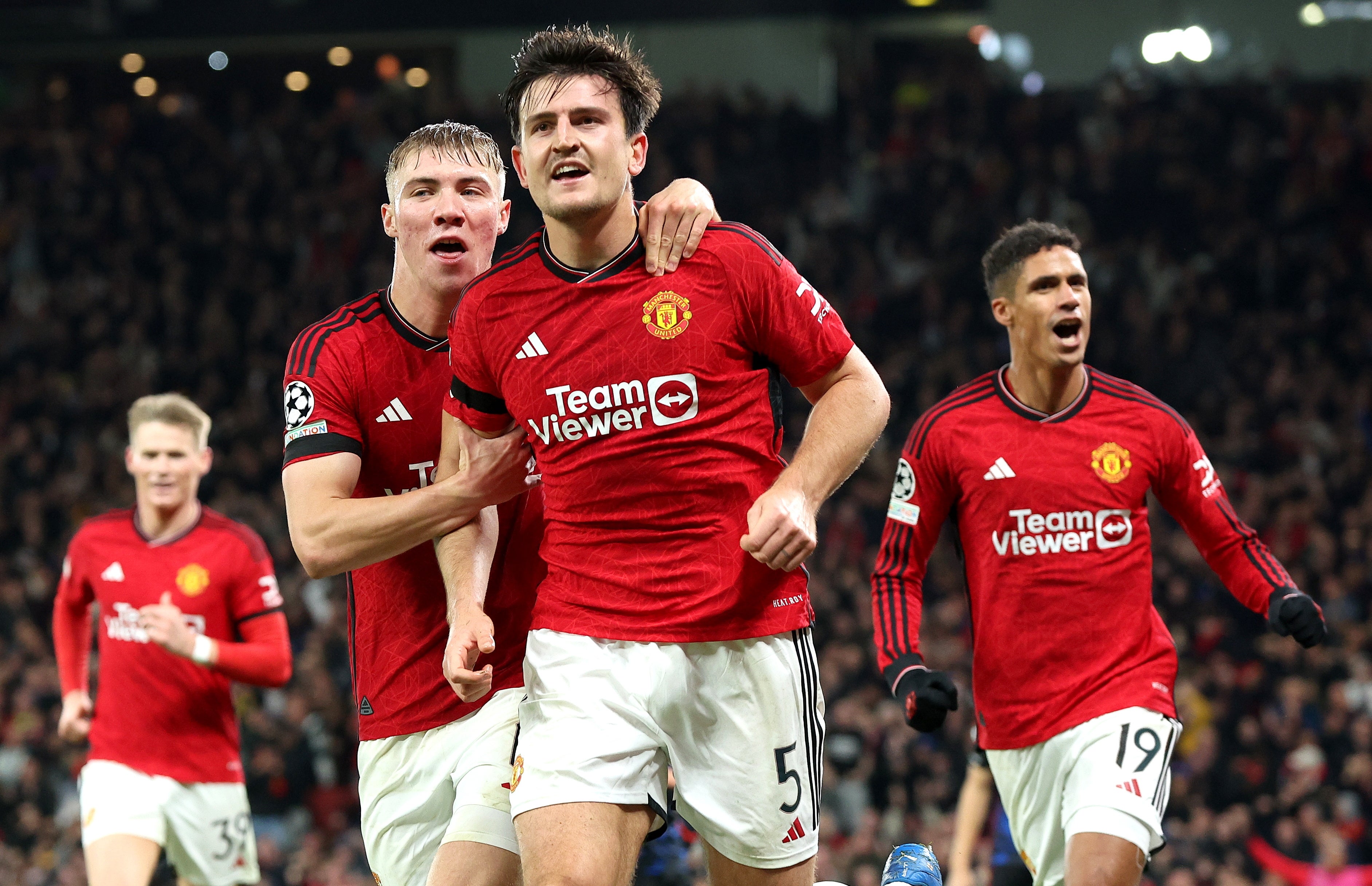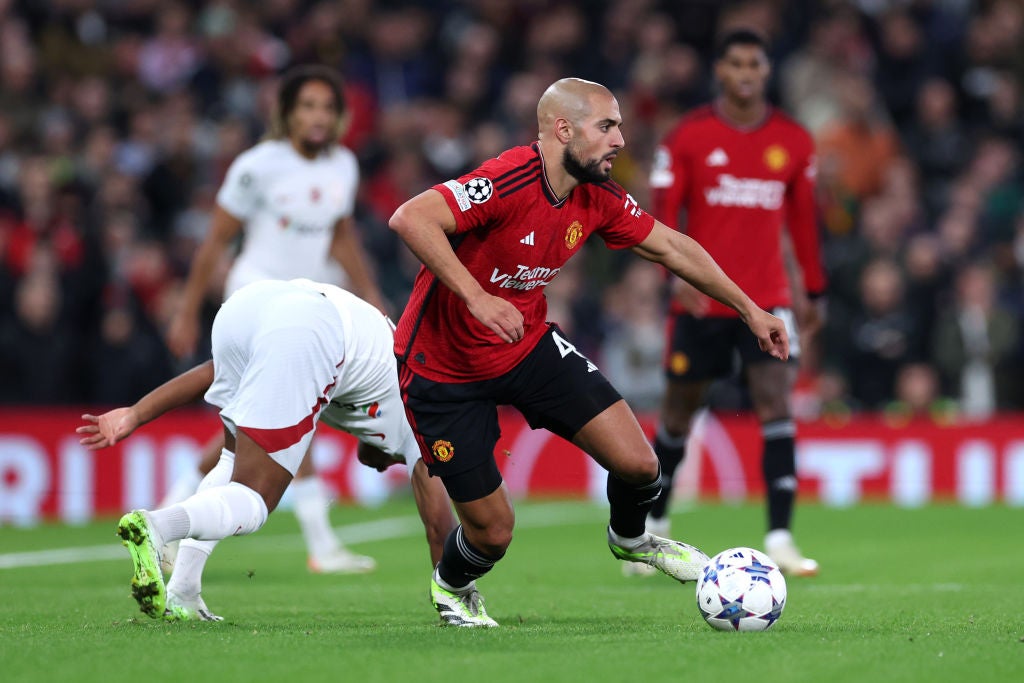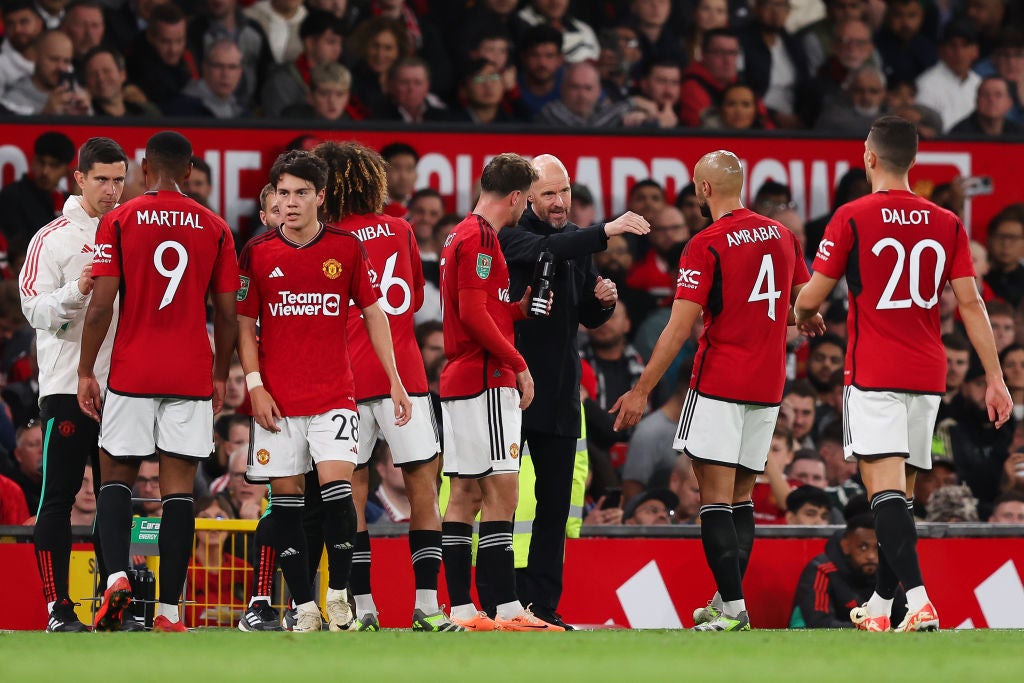Erik ten Hag has abandoned his ideals – and it might help United win the Manchester derby
Erik ten Hag is having to improvise this season without the right players to play in the Ajax mould, but that might make Pep Guardaiola’s job more difficult when they meet at Old Trafford

Your support helps us to tell the story
From reproductive rights to climate change to Big Tech, The Independent is on the ground when the story is developing. Whether it's investigating the financials of Elon Musk's pro-Trump PAC or producing our latest documentary, 'The A Word', which shines a light on the American women fighting for reproductive rights, we know how important it is to parse out the facts from the messaging.
At such a critical moment in US history, we need reporters on the ground. Your donation allows us to keep sending journalists to speak to both sides of the story.
The Independent is trusted by Americans across the entire political spectrum. And unlike many other quality news outlets, we choose not to lock Americans out of our reporting and analysis with paywalls. We believe quality journalism should be available to everyone, paid for by those who can afford it.
Your support makes all the difference.All of Pep Guardiola’s work ahead of the Manchester derby this weekend has naturally revolved around having a high percentage of possession, which is to be expected, but there is one surprising element to it. He has been scrutinising what more pragmatic sides such as Brentford, Brighton and even Copenhagen did against United for instruction.
All of them went to Old Trafford looking to get on the ball and dominate – with mixed success – in a way that at one point would have been unimaginable. It is really only Nottingham Forest who didn’t take that approach this season, preferring to let United have the ball. In United’s nine Premier League games so far, they have had lower possession than their opponent in four of those. In other words, they’ve been chasing the opposition in almost half of their games.
On the ball
Manchester United’s possession in the Premier League this season (per cent)
51 - Wolves (h)
44.3 - Tottenham Hotspur (a)
66.3 - Nottingham Forest (h)
45.2 - Arsenal (a)
43.9 - Brighton (h)
38.2 - Burnley (a)
77.1 - Crystal Palace (h)
63.9 - Brentford (h)
62.5 - Sheffield United (a)
This would be unusual for most big sides in this era but is particularly unusual for a manager in Erik ten Hag who is so consciously a disciple of the Ajax principles, and has now had well over a year in the job. That’s a lot of time on the training ground. Manchester City had even considered him a potential successor to Guardiola, given the tactical alignment.
So it’s fair to wonder why exactly United aren’t closer to any kind of ideal as Ten Hag would surely see it. They currently don’t play anything like his Ajax side, let alone City or that possession-pressing model.
By the same point in Guardiola’s tenure, City were on a winning run that would bring a 100-point season. United have instead gone backwards, which fits into a wider concern over how the side haven’t really had a convincing display since before the Carabao Cup final victory over Newcastle United.
Ten Hag’s recent reliance on Ole Gunnar Solskjaer stalwarts such as Harry Maguire and Scott McTominay would almost seem to sum this up. United are even playing more like Solskjaer’s time, just making do in the moment in order to get through. It's all so ad hoc.

The biggest question, out of many for the United manager, is whether this is a deeper concern. Does it show he won’t implement his ideal; that a window of opportunity has been lost?
As with pretty much everything at United right now, everyone puts it down to injuries. That is the explanation for the unconvincing displays and the pragmatic approaches. Ten Hag hasn’t had the players so has had to compromise.
But is that really sufficient? Would the idealist that Ten Hag supposedly represents not still seek to integrate the squad in an approach that will serve them much more in the longer term?
You only have to look across the way, and the one season when Guardiola faced a broadly similar situation.
In 2016-17, when the City manager still lacked some of the player profiles he wanted – especially at full-back – he still insisted on the exact same approach. John Stones was often the main focus of this. Although the defender was still learning the game, meaning he was prone to mistakes as he endured so much external noise, Guardiola told him to just shut it all out. He followed by telling Stones to keep playing the ball out. Ignore the shouts to get rid. Concentrate on commitment to the ideal. It led to some humiliating moments, not least four-goal concessions against both Leicester City and Everton. Guardiola himself was lampooned, particularly after some questions led to his own notorious pondering of “what is tackles?”
A year later, the City manager was specifically citing that period – and that persistence – as absolutely crucial to the run that effectively made them champions by December 2017. That the win to clinch the title came away to Jose Mourinho’s counter-attacking Manchester United only emphasised the point. An achievement like that 100-point season was a consequence of how the players’ deeper comprehension of the system amplified their performance.
Figures at Old Trafford would fairly argue that Ten Hag was initially going to do this, but the onslaught from those first defeats against Brighton and Brentford at the start of last season was just too much. The second goal conceded at Brentford, trying to pass the ball out from the back, was just too calamitous.
United being United, it brought a level of ridicule and hysteria beyond anything City could face. Ten Hag had to change something or it could have completely destroyed the squad’s confidence in themselves and him, before he ever got the chance to build belief in the system.
They would also point to how Guardiola benefitted from spending £200m on defenders in his second season, including two cornerstones of the era in Kyle Walker and Ederson.
By contrast, Ten Hag has attempted to fill tactical gaps in his side with relatively makeshift signings like Sofyan Amrabat and Christian Eriksen. A serious club, some in the industry argue, doesn't take the team to the next stage with a 20-year-old (Rasmus Hojlund, a Chelsea cast-off (Mason Mount) and two loanees (Sergio Reguilon and Amrabat).

Those at City would nevertheless laugh at such arguments given United’s expenditure over the years. Ten Hag is currently in the process of ousting an £85m signing in Jadon Sancho. City would say their purchases have just been much more forensic.
That isn’t the only potential difference between the situations. Although both Guardiola and Ten Hag have evolved from the same Dutch-Spanish ideology, those national backgrounds have produced divergences in interpretation.
It comes down to different types of purism. Guardiola will stick to the system regardless. It's his way. He will always try and play through it. Ironically, and almost paradoxically, Ten Hag’s willingness to compromise arguably reflects a greater dogmatism.
Those who know the Dutch coach say he has such a fixed idea of certain positions that if he doesn’t have exactly the type of player he wants, he doesn’t see the point of persevering in the same approach.
That’s also why the injuries have been so undermining. Ten Hag has lacked some of his main passers, but especially Lisandro Martinez. The Argentine’s absence has had the effect of forcing Andre Onana to go long and removing that link to the midfield. It disrupts the whole system.
Maguire and McTominay just aren’t suited to that game, but it is to their credit both have persevered and sought to learn in the circumstances. They illustrate this period of adaptation more than anyone, especially given how influential they have been.
There’s almost a contrast in the Scottish midfielder’s game. An instinct for prosaically passing the ball sideways is offset by a willingness to proactively get forward and score.
Maguire meanwhile made a calculation of his own. Sources with knowledge of his situation said one reason he turned down West Ham United was because he saw the issues United were going to have at centre-half. Martinez’s injury and Raphael Varane’s inability to play consistently meant there were going to be chances. Maguire has seized them and then some.
Ten Hag praised his evolution on Tuesday night, as the centre-half furthered his recent redemption with a greatly valued match-winner against Copenhagen.
“He’s playing much more proactive in possession, stepping in, passing vertical, defending also on the front foot, also stepping in, defending forward, very confident in the duels,” the manager argued. “I think he’s dominating in the right moment, putting the question, dominating his opponents.”

United just aren’t doing that on a collective level. All of this is why Ten Hag was so insistent on Frenkie De Jong in his first summer at Old Trafford. He saw his former Ajax midfielder as unique in his interpretation of that specific midfield role the coach wants. The only player Ten Hag saw as coming close, in terms of potential attributes, was Ryan Gravenberch. That’s the reason he went so big on De Jong, against all evidence.
When he couldn’t get De Jong, Ten Hag realised he had to go in a different direction. So it’s been a bit of all or nothing. The same applies to the team as a whole. Either Ten Hag has exactly what he wants, or he just can’t commit to that approach.
It’s why there isn’t too much concern about the visible lack of ideology now. There is confidence that will return when sufficient players return, especially Martinez.
A fair question is whether crucial time has been lost in deepening the ideology. A fair point, meanwhile, is that this actually might serve United against City.
Unless Ten Hag has the team exactly as he wants, it is always going to be a mistake trying to go toe to toe with Guardiola in terms of getting feet on the ball. The Catalan’s City are always going to be so dominant you have to adapt around them. Otherwise, you risk an evisceration.
The current situation plays into that.
United have almost no choice but to plan without possession. The very decision to appoint Ten Hag was supposed to be about something grander, though. They were supposed to be rising to City's level.
United instead have to try and bring the champions down, by leaving them the ball.
Join our commenting forum
Join thought-provoking conversations, follow other Independent readers and see their replies
Comments